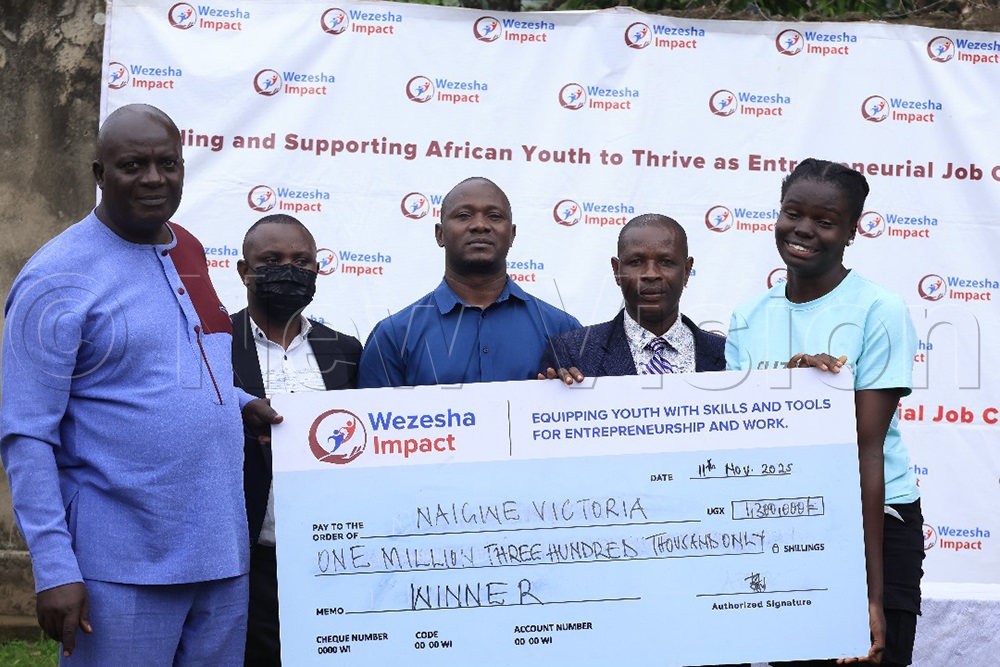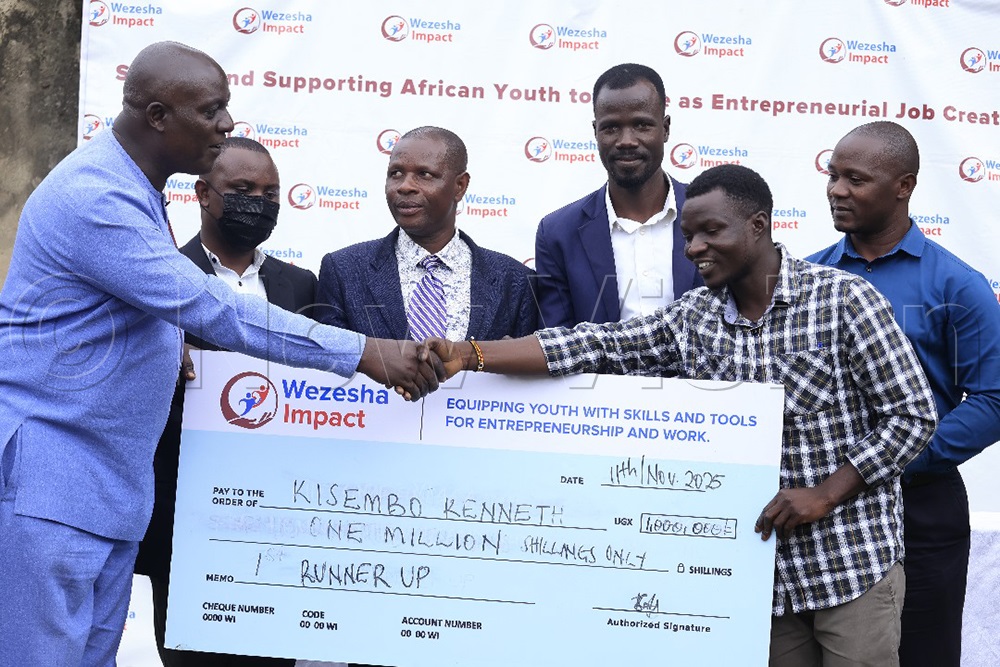Young innovators build Uganda from waste, creativity
The awards honoured young entrepreneurs from vocational institutions who are redefining Uganda through innovative ideas that promote sustainability and self-reliance.
One of the young innovator groups pitching their idea as they brandish their products to the audience during the Wezesha Impact Award ceremony. (Photo by Richard Ategeka)
___________________
Young innovators are transforming unemployment into opportunity, building a new Uganda driven by creativity, courage, and sustainability.
At Iganga Technical Institute, the sound of scissors slicing through plastic bottles fills a small workshop beside the school.
Inside, a group of students led by Job Mukisa turns discarded bottles and wires into colourful chairs and flower vases, transforming trash into art, income, and opportunity.
Mukisa’s initiative is one of many youth-led projects celebrated at the Wezesha Impact Awards 2025, held on November 11, 2025, at the organisation’s premises in Kabuusu, Rubaga.
The awards honoured young entrepreneurs from vocational institutions who are redefining Uganda through innovative ideas that promote sustainability and self-reliance.
Speaking at the event, Mondo Kyateka, assistant commissioner for youth and children affairs at the Ministry of Gender, Labour and Social Development, challenged young innovators to look beyond mere survival.
“If you want to grow, take calculated risks and reinvest your profits,” he said.
Kyateka noted that both government and private sectors cannot employ everyone, underscoring the need for more creative thinkers who can build their own futures.
“Let us celebrate these resilient young minds who are finding opportunities where others see problems,” he added.
Empowering youth through skills
Barbara Atukunda, head of partnerships and development at Wezesha Impact, emphasised that the awards form part of a broader effort to equip Uganda’s youth with practical, market-ready skills beyond the classroom.
“Youth are not a problem; they are a promise,” she said. “When given the right support, they can transform their communities and move from poverty to prosperity.”
Through its Skills and Enterprise Program, Wezesha Impact has trained more than 25,000 young people across 100 vocational institutions and communities in Uganda.
Atukunda noted that their independent evaluation shows that 88 percent of participants have either started their own businesses or found employment.
“These awards are not just about recognition,” Atukunda added. “They celebrate the power of innovation and show young people that their ideas can create real change.”
Building a future from waste
Among the standout innovators was Maxwell Nsubuga, president of the Evolution Group, whose team is tackling deforestation and waste management through eco-friendly brickmaking.
His group of 25 youth produces durable bricks and pavers from cow dung, lime, and clay, offering affordable alternatives to conventional materials.
“We were inspired by the natural waste we see every day,” he explained. “Our bricks are strong, affordable, and sustainable, ideal for people who can’t afford costly building materials.”
In just a few months, the group of 25 has sold over a thousand bricks, proving that innovation doesn’t require fancy equipment but only imagination and determination.
“Some people laughed when we said our bricks come from cow dung,” he recalled. “But after testing them, they saw the quality, and now they’re using them.”
Turning trash into opportunity
Mukisa’s Achievers Recycling Project trains more than 200 students in recycling and small-scale entrepreneurship.
By reusing plastic bottles and wires, the project not only generates income but also helps clean the environment and reduce deforestation.
“We wanted to show that you don’t need money to start a business,” he said. “Instead of throwing bottles away, we turn them into something useful.”
Winning innovators from vocational institutions received dummy cheques for their outstanding projects during the Wezesha Awards ceremony 2025. (Photo by Richard Ategeka)

Winner. (Credit: Richard Ategeka)
Winning innovators from vocational institutions each received sh1.3m and digital tools for their schools, while out-of-school youth took home sh1m to expand their ventures.